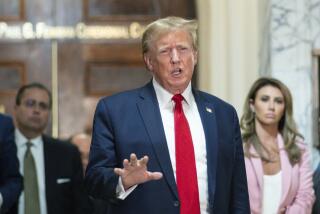Op-Ed: Take it from a magician: Trump isn’t trying to distract us, he’s misdirecting us
Critics of President Trump routinely depict his maneuvers — such as shutting down the government and threatening to close the southern border — as distractions.
“He loves the distraction from his other problems,” House Speaker Nancy Pelosi (D-San Francisco) has said. Ezra Klein, a political commentator and editor at Vox, goes so far as to declare distraction “the core of Donald Trump’s political strategy.”
So pervasive is this notion, political cartoonist Tom Tomorrow titled one of his graphic commentaries, “Are Trump’s Distractions a Distraction From His Distractions?”
As a sociologist who studies political rhetoric and, more important, as a magician, I have a different take. Trump isn’t trying to distract us; he’s misdirecting us. The distinction is important. As Gary Kurtz, a prominent Canadian magician put it, misdirection “has nothing to do with distraction” and “everything to do with controlling audience attention at all times.”
Consider a trick that sleight-of-hand artists perform. The magician has an audience member select a card, sign it, and return it to the deck. Shuffling the deck, the magician bets the audience the contents of his wallet that he can find the card. But despite several attempts, and lots of dexterous flourishes, he doesn’t locate it.
Much as an earlier generation mistook Ronald Reagan for a washed-up movie star, liberals today underestimate Donald Trump.
At last he pulls out his wallet, hands it to the person who signed the card, and asks her to take whatever she finds there. To everyone’s amazement, inside a zippered compartment is the signed card.
Magicians don’t reveal secrets, so I’ll only say that trick is possible because the magician created an illusion that kept the audience’s visual and mental focus exactly where he needed it — and away from actions he didn’t want them to notice.
The same can be said of Trump. Compare his recent threat to close the southern border with the card-in-the-wallet trick. After making his announcement, Trump raised the stakes further by vowing to cut off aid to Central American countries, and he got politicians and pundits chattering about whether in fact he had the ability to seal the border. He got us to focus on the border by creating an illusion that he was about to take startling action there in reaction to a major threat.
Then poof, a week later, when tensions were high over what this could do to the U.S. economy, the president announced he wasn’t closing the border after all.
What had become of the imminent danger to our nation that he’d made so much of earlier? It was set aside for now. Mexico was suddenly “doing a very good job,” he said, even though Mexican authorities reported they hadn’t been doing anything different.
“A magic performance,” asserts Jim Steinmeyer, a historian of magic who has created illusions for the likes of David Copperfield and Lance Burton, “consists of a collection of tiny lies, in words and deeds, that are stacked and arranged ingeniously to form the battlement for an illusion.”
If a truer description of Donald Trump’s approach exists, I haven’t seen it. On average, Trump makes more than 100 false or misleading statements a week. To view these as mere distractions — or more simplistically still, as witless — is to miss the point. His lies create illusions that Americans find appealing.
Trump’s supporters know he lies, but like fans of magic, they accept his lying as part of the deal.
Liberals are entranced by his performance as well. They may not believe the illusions nor excuse the lies, but they can’t look away. Liberals talk endlessly about them at social gatherings and on their Facebook and Twitter feeds, and they watch like-minded pundits yammer about them on MSNBC.
Liberals discussing Trump remind me of some of the 6-year-olds I used to perform for at birthday parties. “That’s just a trick! I know how you do it,” they’d exclaim.
Enter the Fray: First takes on the news of the minute »
Were those kids annoying? Sure. But they were good for the show. Without them, my sucker effects would have fallen flat. A sucker effect is where the magician leads the audience to believe they’ve discovered the secret. I’d “accidentally” let kids see where I was hiding something, only to reveal later that it was somewhere else.
Here’s a suggestion for liberals. Stop being suckers. Much as an earlier generation mistook Ronald Reagan for a washed-up movie star, liberals today underestimate Donald Trump. “The literal-minded were forever troubled by his tendency to sometimes confuse life with the movies,” Dan Rather notes of Reagan. “But he understood, like very few leaders before or since, the power of myth and storytelling.”
Equally do those troubled over and over again by Trump’s lies fail to appreciate what he intuitively understands: the power of misdirection and illusion.
Barry Glassner is a member of the Academy of Magical Arts and author of “The Culture of Fear.”
More to Read
A cure for the common opinion
Get thought-provoking perspectives with our weekly newsletter.
You may occasionally receive promotional content from the Los Angeles Times.






